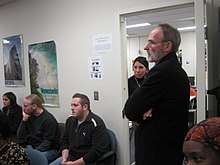Ronald P. Schaefer
Ronald P. Schaefer (born June 17, 1949), also known as Ron Schaefer is an American academic, English professor, and linguist. He is the first person "to devise a written version of a language called Emai",[1] a language reported in 1997 to be spoken by about 30,000 Emai people in Edo State of Nigeria.[2][3] He has been described as one with "fevered intellect, the sharp chin, the untamable kineticism."[4]
Ronald P. Schaefer Dr. | |
|---|---|
 | |
| Born | Ronald P. Schaefer 17 June 1949 |
| Nationality | American |
| Other names | Ron Schaefer |
| Alma mater | University of Minnesota, Texas Tech, University of Kansas |
| Occupation | Linguist, Professor, Scholar, teacher |
| Home town | St. Cloud, Minnesota |
Biography
Schaefer was born in Minnesota in 1949. From 1971 to 1973, he served as a Peace Corps volunteer in Afghanistan where he taught English language at Kabul University.[2] Of the experience he said “What it did for me was open me up to the vast cultural currents that traversed Afghanistan over historical time. Alexander the Great and his armies had moved through. Genghis Khan had moved through. The great Mogul Empires had housed themselves there, and various other significant populations that I had read about in school. Now I was able to see the remnants of their buildings, their wells.”[5][6]
Work on Emai

Between 1981 and 1985, he taught in the linguistics department at the University of Benin. It was there he discovered the language Emai, spoken by one of his students Francis Egbokhare. Emai is spoken about 60 miles from Benin, in the Afemmai Hills of Edo State. Schaefer had first planned to study all the languages of the region, but eventually relented.[7] The motivation for his work on Emai, he said, was to prevent the language from going into extinction.
“Right now, it would be very difficult to find a storyteller, a chief who knew the stories and knew how to tell them as the Emai traditionally told their stories. It’s just not possible. So today, you have young people who are training to be linguists, and they work with a native speaker. They will find some piece of information, or they will find a sound pattern or a syntactic pattern and they will think this is brand new. It may be true, but it will probably come about as a part of incomplete learning on the part of young people because parents are not using the language in the home, and schools certainly don’t use it. We have been fortunate that some schools have used our stories to begin to teach the language, but it is really an uphill battle. By studying your language you learn something about who you are, especially at a university,”[5][6]
Schaefer and Egbokhare have worked together for over thirty years.[8] With Egbokhare, he has produced "a 552 page dictionary of Email, two volumes of oral tradition narratives running to 1,261 pages." Together, they have also published "over 35 books and essays in the space of 20 years."[9]
Work at Southern Illinois University
In 1986, he joined the faculty of Southern Illinois University Edwardsville and was promoted in 1990 to assistant professor, and later to full professor in 1995. In 2010, he was recognized as a Distinguished Research Professor.[2][10]
He retired from Southern Illinois University Edwardsville in 2015.
Notable publications
- A dictionary of Emai: an Edoid language of Nigeria -including a grammatical sketch (2007) with Francis Egbokhare[11]
- Oral Tradition Narratives of the Emai People (1999)[12]
- An Emai Myth‘ is from Ronald P. Schaefer and Francis O. Egbokhare (1999); Oral Tradition Narratives of the Emai People Part I (Research on African Languages and Cultures; Rüdiger Schott, ed.; Volume 5); Lit Verlag; Hamburg.
References
- "St. Louis Post-Dispatch from St. Louis, Missouri on May 19, 1991 · Page 226". Newspapers.com. Retrieved 2017-12-11.
- "Untitled Document". www.indus.org. Retrieved 2017-12-10.
- "St. Louis Post-Dispatch from St. Louis, Missouri on April 21, 1997 · Page 35". Newspapers.com. Retrieved 2017-12-10.
- ""Professor Battles to Save a Dying Language Ron Schaefer of Siue Wants to Preserve an African Tongue and Its 2,000 Years of History" by Florence Shinkle Of The Post-Dispatch - St Louis Post-Dispatch (MO), April 21, 1997 | Online Research Library: Questia". www.questia.com. Retrieved 2017-12-10.
- Romero Jr., Aldemaro (April 4, 2014). "Language is the "lens" to our understanding". The Intelligencer.
- "Language is the "lens" to our understanding - SIUE - MAFIADOC.COM". mafiadoc.com. Retrieved 2017-12-10.
- ""Professor Battles to Save a Dying Language Ron Schaefer of Siue Wants to Preserve an African Tongue and Its 2,000 Years of History" by Florence Shinkle Of The Post-Dispatch - St Louis Post-Dispatch (MO), April 21, 1997 | Online Research Library: Questia". www.questia.com. Retrieved 2017-12-10.
- http://linguistlist.org/, The LINGUIST List (September 2006). "E-MELD School of Best Practice: Documentation Projects". emeld.org. Retrieved 2017-12-10.
- Obafemi, Olu (September 15, 2012). "Laurels in the Humanities (III)". Daily Trust.
- "SIUE expands global outreach with second dual diploma program". AlestleLive.com. Retrieved 2017-12-10.
- Schaefer, Ronald P.; Egbokhare, Francis O. (2007). A dictionary of Emai : an Edoid language of Nigeria : including a grammatical sketch. PanLex Project The Long Now Foundation. Köln : Rüdiger Köppe Verlag.
- "LIT Verlag Berlin-Münster-Wien-Zürich-London". www.lit-verlag.at. Retrieved 2017-12-10.